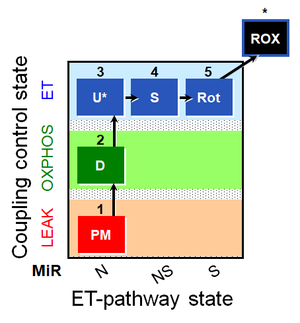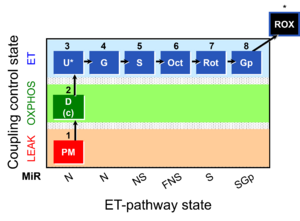Difference between revisions of "SUIT-004 O2 pfi D010"
From Bioblast
| Line 14: | Line 14: | ||
::: '''[[Mark names in DatLab]]:''' SUIT_NS(PM)01 | ::: '''[[Mark names in DatLab]]:''' SUIT_NS(PM)01 | ||
::: '''[[DatLab- | ::: '''[[DatLab-Analysis templates |DatLab-Analysis template]]:''' ''in prep.'' SUIT_NS(PM)01.xlsx | ||
::::* Linked to [[SUIT_FNSGp(PGM)01]] - SUIT RP1, specifically for human skeletal muscle mitochondria. | ::::* Linked to [[SUIT_FNSGp(PGM)01]] - SUIT RP1, specifically for human skeletal muscle mitochondria. | ||
::::* Harmonized with [[SUIT_FNS(PM)01]]. | ::::* Harmonized with [[SUIT_FNS(PM)01]]. | ||
Revision as of 16:25, 20 September 2016
Description
Abbreviation: NS_1PM,2D,3U,4S,5Rot-
Reference: A linked to SUIT_FNSGp(PGM)01 - SUIT RP1 (human skeletal muscle)
MitoPedia concepts:
SUIT protocol,
SUIT A
- SUIT-catg: NS(PM)
- SUIT protocol pattern: orthogonal
- Mark names in DatLab: SUIT_NS(PM)01
- DatLab-Analysis template: in prep. SUIT_NS(PM)01.xlsx
- Linked to SUIT_FNSGp(PGM)01 - SUIT RP1, specifically for human skeletal muscle mitochondria.
- Harmonized with SUIT_FNS(PM)01.
SUIT_NS(PM)01_D(c)
- NS_1PM,2D(c),3U,4S,5Rot-
Link to RP1
- The SUIT_NS(PM)01 protocol is linked to SUIT_FNSGp(PGM)01 for healthy human skeletal muscle mitochondria on the basis of the following rationale.
- The first coupling control steps (1-4) are identical.
- RP1-5G is skipped, since PM and PGM yield nearly identical OXPHOS capacity. However, PM<PGM is a potential diagnostic for a defect in the PM-linked pathway upstream of CI.
- RP1-7Oct is skipped, since octanoylcarnitine exerts practically no stimulatory effect on OXPHOS capacity in state PMS or PGMS, but in conjunction with prolonged exposure may even yield a slight decline of respiration.
- RP1-9Gp is skipped, since glycerolphosphate exerts only a minor stimulatory effect on OXPHOS capacity in state SRot.
- Omission of the three steps described above shortens the SUIT protocol, thus reducing the risk of diminishing respiratory capacity over time, reducing the number of necessary reoxygenations, and providing more time for detailed evaluation of steady-states. The loss of diagnostic information may be minor relative to the benefits of simplification of the protocol, particularly in studies of exercise in healthy humans.
- RP1-10Ama may be skipped, since correction of the initial states by ROX measured in RP1-10 Ama may represent an over-correction, and inhibition takes a very long time in several cases (Pesta 2012 Methods Mol Biol).
- RP1-11Tm and RP1-12Azd are skipped, if a prolonged protocol is not practical due to limination of time.


